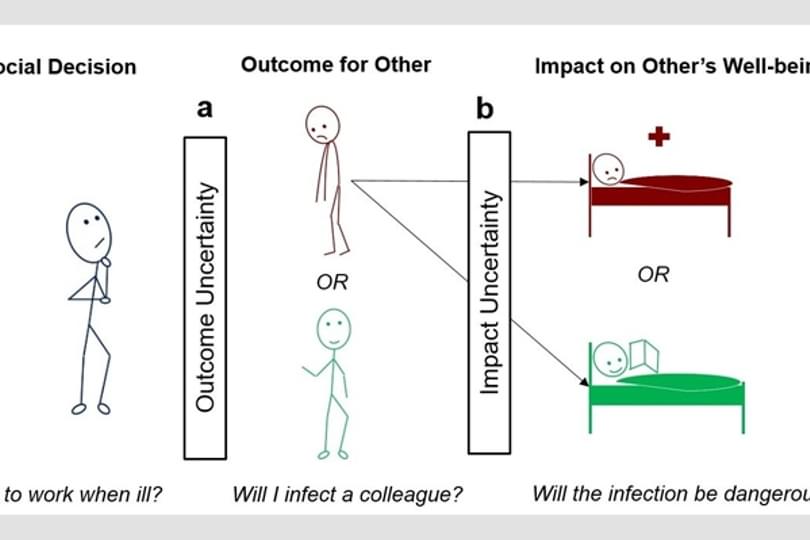
Changing public health messaging to focus on the impact of our actions - for example the potentially harmful impact of infecting a colleague with a cold, rather than whether we will infect them if we go into work in the first place - could have significant implications for how we deal with global threats, according to a new study from City University of London, the Oxford Martin School, and Yale University.
Uncertainty about how our choices will affect others is a common occurrence in our social lives, with previous research suggesting that such uncertainty leads to solely selfish decisions and actions. However, the new study found for the first time that uncertain situations do not always lead to selfish behaviour. Appealing to people to think about the impact of such potentially harmful actions can lead to decisions which err on the side of caution. The paper Uncertainty about the impact of social decisions increases prosocial behaviour is published this week in Nature Human Behaviour.
When it comes to social decisions, the uncertainty we face can be split into two types, known as outcome uncertainty (i.e. uncertainty about the outcomes of decisions) and impact uncertainty (i.e. how an outcome will impact another person).
The researchers found that by focusing on messaging which appeals to impact uncertainty, and not outcome uncertainty, participants reported that they would be more willing to adopt behavior that would help contain the threat of infectious disease, highlighting the relevance of the findings for addressing global threats. This discovery could also enable public health officials and policy makers to nudge people towards less selfish decisions when faced with such issues.
To explore how people responded to impact and outcome uncertainty, the researchers carried out a series of experiments which varied the information participants received about the people potentially affected by their decisions. The results suggest that outcome uncertainty activates self-focused narratives that enable people to tell themselves that it is very unlikely their actions will harm another person, allowing them to reap the benefits of self-interested actions without feeling selfish. Such self-focused narratives can lead to selfish behaviour by downplaying the potential social costs of self-interested actions.
However, the findings suggest impact uncertainty activates other-focused narratives that include potential social costs, leading participants to adopt behaviors that preserve others’ welfare. Notably, these narratives may cater for self-image concerns (e.g., “only a horrible person would risk infecting a vulnerable other”).
Dr Andreas Kappes, an Oxford Martin School Research Fellow, currently at the Department of Psychology at City, University of London and lead author of the study, which was funded by the Oxford Martin School, said:
“When we talk about the uncertainty surrounding how our actions will affect another person, how climate change will affect humans or how infectious disease threat humanity, we mostly focus on the likelihood of the outcome: Is climate change real? How likely is another pandemic? This outcome focus makes people selfish: They start to ignore the impact their actions might have for other people. But when we explicitly start talking about the impact our actions might have on the well-being of another person, people start to care about how their others. Hence, it is important to talk about both, the uncertainty about what might happen, but also the uncertainty about what might happen to other people because of our actions.”
Ethicist, Professor Julian Savulescu from the Oxford Martin School and a senior author of the study, said, "In 2013-14, about 11 000 people died of the flu in the UK. Changing behaviour, including getting vaccinated, is a life and death issue. We now know the way to people's hearts is not by giving them probabilities or statistics, but showing them the potential impact of their choices on another individual. Not getting vaccinated can be just as lethal as shooting a gun."